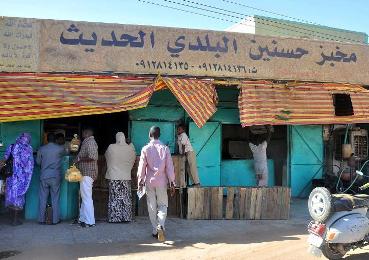Severe bread and cooking gas shortages hit Sudan
January 19, 2014 (KHARTOUM) – Several Sudanese states including the capital Khartoum have witnessed sharp shortages in bread and cooking gas as large numbers of people queued in front of bakeries and gas cylinders distribution shops.

Several towns in Gezira state besides River Nile state town of Shendi saw severe shortage of bread while residents of north Khartoum and East Nile localities in Khartoum state complained of the same problem.
In a tour made on Sunday, a Sudan Tribune reporter verified the extent of the crisis at several bakeries due to lack of wheat flour.
A similar situation erupted last November with the government attributing it to an administrative glitch in the distribution of baking flour quotas.
Several bakery owners said that they are getting 50% less flour quotas assigned to them.
The owner of a bakery in al-Sahafa neighborhood east of Khartoum said that shortage in baking flour began two months ago when distributing agents reduced quotas of bakeries by 25%, pointing that quota was again reduced by another 25% two days ago.
Sharp differences occurred last year between Khartoum state government and bakeries union which is part of the union of the industrial chambers on bread price following the recent economic measures.
The bakeries union proposed selling 3 loafs of bread instead of 4 loafs at one pound or reducing bread weight which is determined by the state at 70 grams. However, the government rejected the proposal and maintained the price and weight of bread.
Sudan currently imports more than 2 million tons of wheat annually at a cost of $900 million.
Last September the government announced the second batch of subsidies cut but kept its support to prices of the bread.
The reduction of subsidies on basic commodities are part of an austerity plan introduced in July 2012 to reduce the government spending by $1.23 billion.
The measures led to countrywide demonstrations in which rights groups say that over 200 Sudanese were killed.
(ST)
